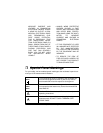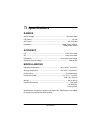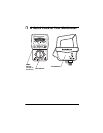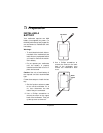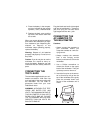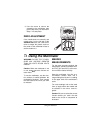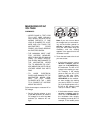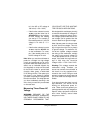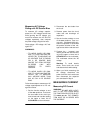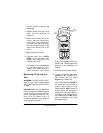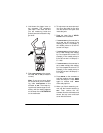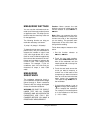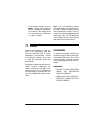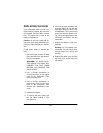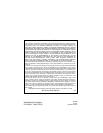
16
Using the Multimeter
MEASURING WATTAGE
You can use the multimeter and am-
meter to tell how many watts of power
an appliance uses. This helps you de-
termine what the electricity costs are
for that appliance.
The following formula can help you
make the necessary conversion.
V (volts)
×
A (amps) = W (watts)
To determine how many watts an ap-
pliance uses, use your multimeter to
measure the number of volts it uses
(120 volts single-phase AC is stan-
dard for most household appliances)
then connect the ammeter to the mul-
timeter and use both to measure the
current it uses. Then multiply those
numbers. For example, if your air
conditioner uses 120 volts and you
measured 10 amps, it uses 1,200
watts.
MEASURING
RESISTANCE
The resistance measuring circuit in
your multimeter compares the voltage
gained through a known resistance
(internal) with the voltage developed
across an unknown resistance.
WARNING:
BE SURE THE CIRCUIT
UNDER TEST HAS ALL POWER
REMOVED AND ANY ASSOCIATED
CAPACITORS ARE FULLY DIS-
CHARGED BEFORE YOU MAKE A
RESISTANCE MEASUREMENT.
Caution:
Never connect the test
leads to a source of voltage when the
function selector is set to
R
×
××
×
1K
Ω
or
R
×
××
×
100
Ω
.
Note:
When you measure the resis-
tance of a component in a circuit, dis-
connect one side of the component
you are testing. This prevents other
components in the circuit from inter-
fering with the reading.
Follow these steps to measure resis-
tance.
1. Set the function selector to
R
×
××
×
1K
Ω
or
R
×
××
×
100
Ω
.
2. Touch the test leads together,
then rotate
OHMS ADJUST
on the
side of the multimeter until the
needle points to
0
on the top line
on the multimeter.
3. Touch the test leads across the
circuit you want to measure, or
remove one of the leads of the
component you want to measure
from its circuit and touch the test
leads across the component.
Then read the top
OHMS
line on
the multimeter.
• If the function selector is set to
R
×
××
×
100
Ω
, multiply that reading by
100 to compute the resistance.
For example, if the needle points
to
1
, the resistance is 100 ohms
(1
×
100 = 100
Ω
).



